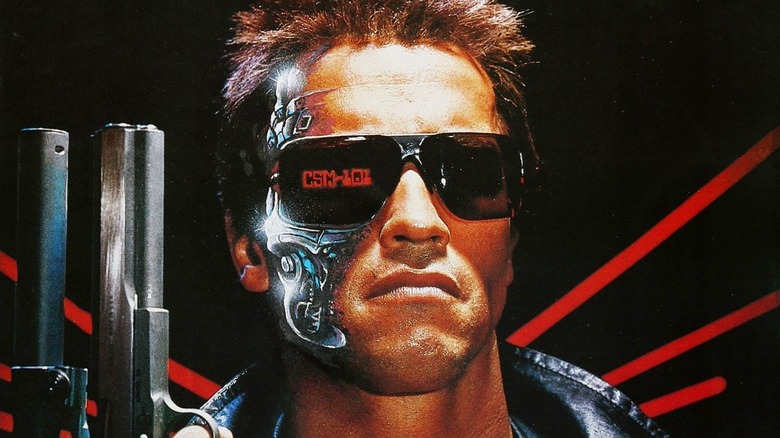Why The Terminator Theme Is Unlike Any Other Movie Score
Director James Cameron's classic 1984 sci-fi thriller "The Terminator" hauntingly taps into Cold War-era fears of a global nuclear holocaust with its nightmarish vision of a post-apocalyptic future where self-aware machines threaten to wipe out the last remnants of humanity. It's also full of charmingly funny details that date it as a relic of the '80s, from Arnold Schwarzenegger dropping cheesy one-liners as the T-800 hunting Sarah Connor to Linda Hamilton's wonderfully blown-out hairdo as the mother-to-be of the future's human resistance leader. And let's not forget Bill Paxton's gloriously blue spiked hair in his brief role as the doomed "Punk Leader."
While the "Terminator" score by Brad Fiedel is similarly reminiscent of the many other synth-heavy film soundtracks that came out of the '80s, the machine-like precision of its recurring beats — combined with its blend of metallic and electronic sounds — also makes it the perfect fit for a movie about a time-traveling killer cyborg. But at the same time, there's something unique about Fidel's main "Terminator" leitmotif that sets it apart from the equally simple, unnerving horror themes for movies like "Jaws" and "Halloween." That's not just me carrying on, either; Fiedel's score is literally unlike most other film scores due to its unusual time signature.
Come With Me If You Want to Make Film History
"The Terminator" score (see the above video) wasn't easy to finish either, as Fiedel has admitted:
"Terminator was very difficult because I was using many different synths and sequencers and because I didn't have midi available on many of them I had to sync them by hand. This is why the main theme is in a very odd time signature. The looping of the Prophet-10 was just a little short of a complete measure."
In order to complete the "Terminator" score, Fiedel reached out to jazz musician George Kahn, a friend of his who had the formal training needed to finish putting the music to paper. Khan then took it upon himself to figure out the score's time signature, upon realizing it was "quirkier" than something more conventional like 6/8 (which was Fiedel's initial rough estimate). He ultimately concluded it was 13/16: "Three plus three plus three plus two plus two."
Fiedel would go on to reunite with Cameron on "Terminator 2: Judgement Day" and "True Lies" before quietly retiring from scoring movies and TV projects in the late 1990s. His main "Terminator" theme later resurfaced in "Terminator 3: Rise of the Machines," as well the opening titles for "Terminator: The Sarah Connor Chronicles." The latter's composer, Bear McCreary, also took noticeable inspiration from Fiedel's original "Terminator" soundtrack for the show's soundscape of industrial noises, and for good reason: it's really unlike anything else in the world of screen scores.
